Articles about reggae music, reviews, interviews, reports and more...
Interview: Marc Ismail (Soul Of Anbessa)
- Home
- Articles
- Interviews
- Interview: Marc Ismail (Soul Of Anbessa)

Interview: Marc Ismail (Soul Of Anbessa)
"It's not for nothing that Johnny Osbourne is among the few artists who managed to cross all eras of Jamaican music"
Sampler
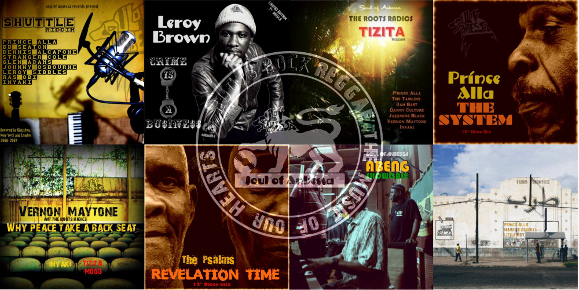
Can you start by introducing yourself in a few words?
Well my name is Marc Ismail, 38, I am a Swiss journalist, and I have had a great passion for at least two decades, an active passion for vintage Jamaican music with a focus on roots-reggae, but also on what was done before. And it’s been about ten years since I launched my own little independent label called Soul of Anbessa. A small label that turns at a rate of 2-3 vinyl releases per year. A special feature is that I work with people who have been my musical heroes for years, artists whose records I have been collecting. And now I have the chance to produce them, some of them have even become close friends. It is an old daydream that I have been living for some years. It's really a second life, next to my professional life that allows me to keep the pot boiling, to fulfill me spiritually and artistically. This label is something very important to me.
This label, was it your first activity in reggae? Or did you have a sound system, a radio show or something?
I have never had a sound-system, even if I used the term for convenience. But I mix at a few parties, since 2000 approximately. Otherwise, when I could, I've always written about reggae in the media, when they left me room to do so. And above all, I have dedicated my thesis for my Masters in Contemporary History to :reggae: two years of work during which I studied the development of the reggae scene in Switzerland. That was just the starting point.
When did you go to Jamaica for the first time? Was it to work on this thesis?
No, I first went to Jamaica in 98. I already had this strong passion for Jamaican music, but I knew very little. I knew no one there, it was a great shock, in every sense. Positive because I was fascinated to be there, and negative because I was with a friend and had been rather violently robbed... For a moment it was something unfinished, I lived with this passion and I thought, "I must go back there, I cannot stay on this." And then, a few years later when I finished my thesis, in 2004, I said to myself, "now that I have studied this history so much, maybe I can add, humbly, a small stone to this building ". Meanwhile, I met Prince Alla, during his tour in Switzerland, via Asher Selector. And it allowed me to build a relationship with him here in Switzerland, thanks to Asher who let us accompany him everywhere, see him each time in the backstage etc… In May 2006 I came to Jamaica; I was sincerely terrified... I mean, Jamaica is already a tough world, Kingston is a hard world, and I come from the exact opposite, I come from a small and quiet Swiss village, I'm really an altar boy in there! At the same time I felt a force inside that told me "try it, come on", and I thought "OK, let’s just do ONE piece, on top of my masters thesis, since I know Prince Alla… let’s try!"
You still had no studio experience at that time?
No, the first time in my life that I set foot in a studio was at Mixing Lab, which is really a huge studio, a world class studio! I had never even seen a home studio before. And this session with Sly Dunbar and others was so amazing that I caught the virus, I said to myself "I will continue!”. Now I feel a real urgency, because the people I want to work with, it’s a generation that is gradually dying out. I think we have a 10-year window ahead; I have already lost several close people, with whom I worked. We are lucky to see the twilight of this generation of pioneers who are still, for a good part of them, quite ready to play, especially the musicians. So now, it’s this approach, old-school until death, and the advantage I have is to be fully independent, I do exactly what I want to do.
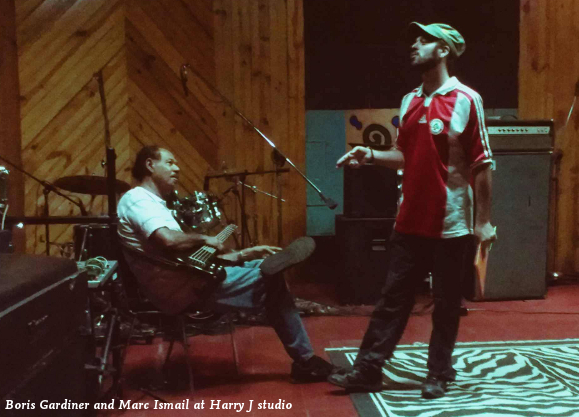
How do you compose your riddims? Who composes? Do you do it alone or with others?
It's always me who composes, with my meager musical skills. I think I have a good ear, that is the starting point, howeverI cannot read a note. I learned guitar 10 years ago, which allows me, being very far from a virtuoso, to know the name of the chords and to be able to compose riddims. The advantage is that reggae-music is quite simple, at least on paper; to play it well is a different story; but it’s not complicated like progressive rock or bossa where I guess you have to go further in your knowledge of music to begin to compose. But having listened to reggae for years and read a lot about it, I am very familiar with this music and its history, so I can easily enough talk to the artists and make them understand what I want exactly. And, of course, I can’t stress this enough: I work with the Rolls-Royce of music. The people I work with, they are the best of the best, only to see them working is amazing. For example, I play some bass, I could compose a bass line... But I have Boris Gardiner in the studio, I’m not going to invent a bass line for Boris Gardiner. Whatever I do, he'll improvise something in 10 seconds which will be a thousand times better, because he's a genius! They have such a feeling, they are so good... I compose, but they have great freedom of expression.
And what about the lyrics, the songwriting?
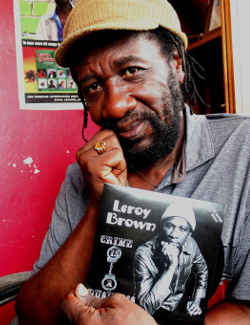 For the lyrics it depends on the artists. For example, a funny anecdote about a song whose lyrics I really like is Crime is a Business from Leroy Brown. We had a long discussion at his home, we talked about everything and nothing, including the privatization of prisons. And the next day, while we didn't talk again about all these things, we had a studio session, and he arrived with his lyrics, telling me "I thought back to what we discussed." I loved it, it's great, it flows naturally from a discussion we had the day before. It's great to live it, because there are so many songs that are born like that, in all musical genres, but particularly in the one that interests us. They have a discussion, they had an idea, saw something on the way to the studio or two days before... And for us it has become immortal classic, whereas for them it was born like that, almost spontaneously!
For the lyrics it depends on the artists. For example, a funny anecdote about a song whose lyrics I really like is Crime is a Business from Leroy Brown. We had a long discussion at his home, we talked about everything and nothing, including the privatization of prisons. And the next day, while we didn't talk again about all these things, we had a studio session, and he arrived with his lyrics, telling me "I thought back to what we discussed." I loved it, it's great, it flows naturally from a discussion we had the day before. It's great to live it, because there are so many songs that are born like that, in all musical genres, but particularly in the one that interests us. They have a discussion, they had an idea, saw something on the way to the studio or two days before... And for us it has become immortal classic, whereas for them it was born like that, almost spontaneously!
Can you, just to brag a little bit, off the top of your head tell us a few names you have worked with? As you said it’s a daydream, it’s a freaking all-star!
So... (laughs). BB Seaton, I must mention him first, he is the godparent of the label! Prince Alla, he is more than a friend, he's almost a family member to me. The Tamlins, Leroy Sibbles, Johnny Osbourne, the Gaylads, who I helped to reunify for the song “Together again”, Leroy Brown, KC White, Stranger Cole… Keyboard-wise it's not bad, I had Ansel Collins, Glen Adams, Robby Lyn. I had the best, post-Jackie Mittoo! I worked with the Roots Radics, before the tragic death of Style Scott. Now I work a lot with the same people: Derrick Stewart, drummer of the Conscious Minds, Boris Gardiner (Now Generation, Upsetters…), Robbie Lyn (Now Generation, Sound dimension…) and Dwight Pinkney (Zap Pow, Roots Radics…). Dwight is a great friend, someone who has been kindness and generosity personified to me. He’s the only musician who is really on all my productions, because he’s great and I owe him at least that.
Was there one that particularly impressed you in all those?
I would say Johnny Osbourne, he is really amazing, it's not for nothing that he is among the few artists who managed to cross all eras of Jamaican music. There is another who is ultra-impressive, I forgot to mention him, it’s Vernon Buckley, lead-singer of the Maytones. On the track we did together, Why Peace Take a Back Seat, I sent him the riddim, and with no exaggeration, 45 minutes laterhe had sent me a demo with vocal and harmonies! And that was already awesome!
We come to the latest production, the Tarab riddim. You open the series, again with your friend Prince Alla.
We recorded it in the fall of 2014. I really wanted a pure one drop. The previous riddim (Abeng) was already supposed to be a one drop, but Derrick Stewart started playing more dancehall with the bass drum on the one, and it fitted so well with the bass line that I said "Ok we’ll keep it like that!". But then I wanted a pure one drop, something that sounds older. I looked for something with melancholy in it, a little bittersweet. The song was built around the trombone part: I had this melody in my head, and began to tinker around. Already in the studio I was like "I'll call it Tarab" (which is a word in Arabic, similar to the Spanish duende, which refers to the ecstasy provoked by the music) because that was the feeling, exactly what I wanted. Prince Alla had a draft of lyrics, and we finished them together. I love his words, Prince Alla underestimates himself as a lyricist. I find what he wrote very beautiful and very simple, touching, it comes away from the usual clichés of reggae.
 Maurice Roberts is a founding member of the Gaylads trio and according to Coxsone, he was the core of the sound of the Gaylads
Maurice Roberts is a founding member of the Gaylads trio and according to Coxsone, he was the core of the sound of the Gaylads
You spoke earlier of the urge to record some artists before they passed away... and sadly, the second piece of this series, "Thank you Jah" by Maurice Roberts, will be release posthumously…
Maurice Roberts is one of those people whose importance in Jamaican music is not fully understood. I realized by being in Jamaica with him, seeing the other artists interact with him. He is a founding member of the Gaylads trio and according to Coxsone, he was the core of the "sound" of the Gaylads, because he had an extremely deep voice, even at that time. He’s also a great bassist, in 1967 he already played on all the songs of the Gaylads, then with Conscious Minds. After that he became a studio musician for Perry at the Black Ark studio, then did the harmonies for Bunny Wailer with the Psalm for almost 20 years... So he's really a foundation artist, who began his career in 1963... He's someone who really touched me on the human level, I loved his voice, he had the same voice when he spoke and when he sang. I have a fascination for very deep voice... it's really like Leonard Cohen when he speaks but with the Jamaican accent. And all of a sudden, this was going to be his first solo piece. BB Seaton told me that at the time he had recorded a solo Studio One track, but it was never released. So I was quite proud to say "For the first time there will be your name on it," he was very happy about that... and unfortunately he died suddenly this summer. It will be written on the vinyl, it will be dedicated to his memory, but I will give it to his widow and unfortunately not to him... The song is really good, I like it, there's this really ultra-deep voice, but very fragile, because he had health problems. This contrast makes the song staggering, you feel a real fragility, it is almost at the limit sometimes. For people who will listen, I think either you will love it or you'll hate it. And additionally, I have a flautist in France who added two lines of flute with a very oriental sound, very rough, and that completely changes the atmosphere of the riddim, I am very happy with this piece.
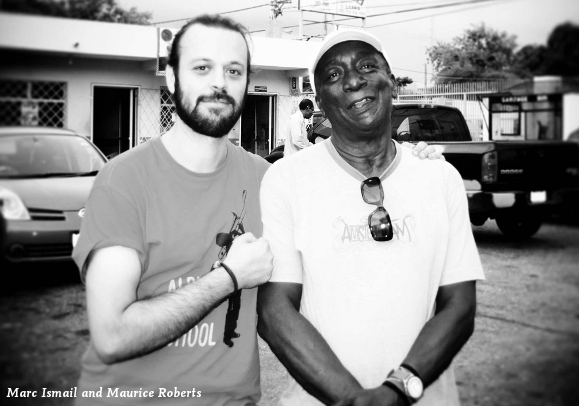
Maurice Roberts, founding member and bass voices of the Gaylads, died on August 16, 2015 in Kingston.
And the third version? Who sings? Those three songs will come out on the same disc?
The third version is also with someone I wanted to work with for a long time; Little Roy, who made me a great track called Misleading. Yes, it will be a maxi 12 inch, with the three vocals and one dub version. I opted for this format for several reasons: firstly the manufacturing cost is super expensive, but also because it allows me to make great pictures sleeves. I think I'll do much more of those in the future, the larger format is attractive, and I think it's important to provide information on those who are playing.
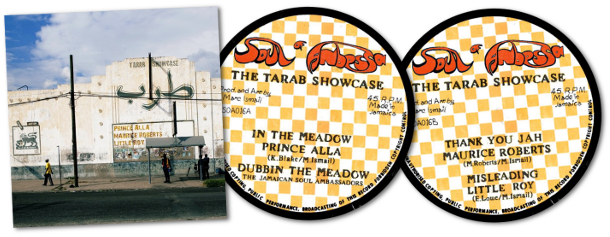
The harsh question: when you see the quality and commitment you put into your productions, are you not a little frustrated that they do not reach a slightly wider audience?
Not really, no. I love getting out discs and all, but I would say it is really secondary compared to the experience of being in the studio with all these people. Once it is recorded... all the "creation/ promotion of the disc" process is not what interests me the most. The only thing, to speak really prosaically: of all the records I released, there's only one that I have not lost money with. I don’t really care about that, the thing is, I might not be able to keep it up for long. The goal would really be to be in equilibrium. But really, it is secondary, when I have people feedback, connoisseurs who I respect, who enjoyed the song and told me that "my daughter is four years old, she loves it,"… it fulfills me!
And this trip last autumn to Jamaica? You came back with several riddims in your luggage, right? What can be expected on Soul of Anbessa in the relatively near future?
Yes I have two other riddims in tucked away. The second is another one-drop, a little faster and a little more soul. And the third one is built for sound system, a big, big rockers, which should be pretty baaad...
Anything you’d like to add?
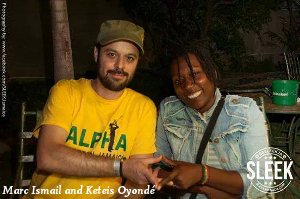 Yes, I wanted to talk about something: I'm working with a Jamaican singer who is not well known yet, but she is one of the most incredible voices I heard in my life. Her name is Keteis Oyondé, and we will do many things together. A version of the second riddim recorded last fall; and a big nyabinghi song. We will even do two versions of this Nyahbinghi song: an ultra-deep version in Amharic language, Count Ossie style, with contrabass and everything, and then a version in English with electric bass, sharpened for sound system. That is well underway and it will come next year.
Yes, I wanted to talk about something: I'm working with a Jamaican singer who is not well known yet, but she is one of the most incredible voices I heard in my life. Her name is Keteis Oyondé, and we will do many things together. A version of the second riddim recorded last fall; and a big nyabinghi song. We will even do two versions of this Nyahbinghi song: an ultra-deep version in Amharic language, Count Ossie style, with contrabass and everything, and then a version in English with electric bass, sharpened for sound system. That is well underway and it will come next year.
Can’t wait to hear that! I would have continued for an hour, but I have to stop now. Thank you Marc.
Thank you.

Read more about this topic
Comments actually desactivated due to too much spams
Browse by categories
Recommended Articles
Latest articles
Recently addedView all
© 2007-2026 United Reggae. All Rights Reserved. Reproduction in whole or in part is prohibited. Read about copyright
Terms of use | About us | Contact us | Authors | Newsletter | A-Z














